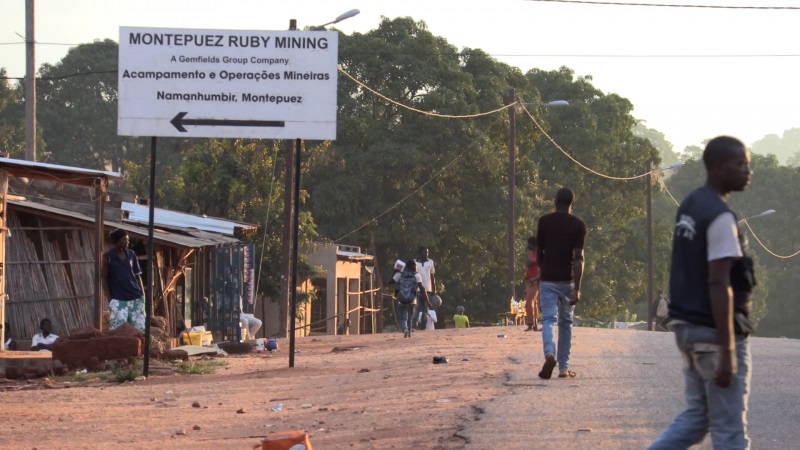Mission 300 gains momentum as Burundi, Ghana, Mozambique, Togo and Zimbabwe submit transformative ...
Ruby miner Gemfields to pay $8.3 mn to settle Montepuez torture & murder claims – By Joseph Hanlon

File photo
Gemfields has agreed to pay $8.3 mn to settle 273 claims of killings, severe beatings and house burnings related to the Montepuez ruby mines, the company announced today. Importantly, it has agreed an independent grievance panel which can award compensation for any future claims. (http://bit.ly/Ruby-LD2)(http://bit.ly/Ruby-Gem)
The case was brought in the London High Court in April 2018 by human rights lawyers Leigh Day claiming “serious human rights abuses at or around Montepuez Ruby Mining’s (MRM’s)” mine. (bit.ly/Ruby-LD) The 273 claims included 18 people said to have been killed by mine security forces and Mozambican police, including shooting, beating to death, and burying alive. There are nearly 200 claims of beatings, torture, and sexual abuse – many leading to such serious injuries that people’s subsequent ability to work was limited. And there are 95 property claims related to the repeated burning of Namucho- Ntoro village; some people allege they were both beaten and had their houses burned. All incidents are said to have occurred between 2011 and 2018.
The case was settled through mediation, which means it could be settled on a “no-admission-of-liability basis” and thus Gemfields admits “instances of violence have occurred” but says that it is “not liable for the alleged incidents”. But, significantly, Gemfields agreed to settle all of the claims.
GBP 4 mn (British Pounds 4 mn; $5.3 mn) will be paid in damages. Each claimant will have a bank account opened and their damages will be deposited in the account. In addition, GBP 500,000 ($660,000) will be used to create a new livelihoods programme in the resettlement village now being built for the 100 families of Namucho-Ntoro village. GBP1.8 mn ($2.4 mn) will go to Leigh Day to pay the costs of investigation and backing up the claims, as well as bringing the case. Gemfields has also agreed to set up an independent panel to hear claims and award compensation, and Leigh Day agreed it would not bring or support any further claims against Gemfields or MRM relating to this period. More claims are possible as local people say there are many other claims which were not included in the London High Court case.
The settlement may seem a lot of money, but Gemfields says that the mine’s first 11 ruby auctions “have generated $463 million in total revenues” – so its payment to the community is less than 2% of ruby sales.
The mine has very high level political links. MRM is 75% owned by Gemfields and 25% by Mwiriti, which is controlled by Raimundo Pachinuapa, a liberation war commander now on the Frelimo Political Commission. MRM is chaired by Samora Machel Jr. Pachinuapa’s son Raime is MRM’s director of corporate affairs.
The torture and human rights violations were first exposed by journalist Estacio Valoi, notably in a 2015 Al Jazeera film (http://bit.ly/Ruby-AJ) and 2016 Foreign Policy, Zam and Mail&Guardian articles. (bit.ly/Ruby-FP) (bit.ly/Zam) (bit.ly/Ruby-MG) They were then confirmed by the Mozambican Lawyers Association (Ordem dos Advogados de Moçambique) in a 1 August 2017 statement that called for prosecutions of those responsible for “the macabre, degrading and inhuman acts of torture and exceptional violence perpetrated by members of the riot police” (Unidade de Intervenção Rápida, UIR) and the mine security force, which includes senior expatriate staff who supervise hired local people, known as “macatanas”. (bit.ly/Ruby-OAM) A “catana” is a machete, so the “macatanas” are the “men with machetes”, who sometimes do joint security patrols with the senior expatriate staff, UIR, police, and the government’s Natural Resource and Environment Conservation Police (NRPF).
Since the lawyers’ call, there have been no Mozambican prosecutions or civil claims for compensation, so redress was only gained by lawyers bringing the case in an English court.
How will those evicted earn a living?
Rubies were found in 2008. Northern Mozambique has a long tradition of artisanal gemstone mining. The find attracted the attention of both Informal miners, known as garimpeiros, and the big boys. Pachinuapa’s Mwiriti won the mining licence and the rights to 34,000 ha – 340 square kilometres, which would be a square 19 km on each side.
Mozambique’s land law is praised because it gives land rights to occupants, but the mining law overrides the land law, and hundreds of families have been evicted from mining concessions.
The village of Namucho-Ntoro had existed for 45 years in the middle of the land given to Mwiriti and MRM. There were violent raids on the village in 2014 and 2017 when houses and belongings were burned or destroyed by Caterpillar machines, tear gas was launched into the village, and villagers were beaten. Farmland was taken, and only some people received compensation; some residents were not permitted to farm any longer.
This is not an area with much good farmland, and many people were left without farms, and thus without incomes. As large tracts of land are allocated to mining companies for rubies and other gemstones, graphite, marble and other minerals, less and less farmland is available.
This has become a problem for the proposed resettlement village finally agreed last year for the people of Namucho-Ntoro. The proposed farmland is 8 km from the village – a two hour walk.
Lacking other income, by last year, many young men in villages in the area had turned to small scale mining as the only source of income. This occurred inside and outside the MRM area. The area is suitable for artisanal mining because the gravel beds with rubies are close to the surface, and it is possible to dig a pit with hand tools – although these have no supports and are unstable.
Clearing the concession by violence
Local people say MRM moved to gain control of its huge concession through systematic violence. It made almost daily raids, often with government security forces who were paid extra by MRM, to expel both the miners who had been there before MRM won the concession, as well as those who arrived later. The security forces are said to have deliberately sought to punish the miners in a brutal and humiliating fashion, trying to deter them from returning. But with no other source of income, many did.
It is alleged that in some cases the intent was to maim, breaking bones and burning with hot sticks. A central object was humiliation. Sources say miners were forced to beat each other. Some were forced to lie face down with heavy stones on their backs. There was a sexual content – in at least one incident, it is said that miners were forced to watch while women were raped.
In one reported incident miners were said to have first been forced to do press-ups with stones on the back. Then the security forces made holes in the ground and two miners were forced to do press-ups putting their penises into the holes, while foreign security specialists videoed the process.
Indeed, it is reported that part of the humiliation was that mine and state security people watched the beatings and sexual violence, and sometimes filmed it. One video shows a senior security officer watching. After the beatings, miners were often taken to mine camps to carry out forced labour – cleaning toilet blocks, vehicles and equipment – and in the cool season forced to undress, doused with water, and forced to spend the night outside.
In the worst cases, miners reported seeing other miners shot in their pits or being buried alive; at least 18 people are alleged to have died from shootings, beatings, or burials.
Police set up roadblocks in and near the mining concession to extract bribes and sometimes confiscate motorbikes and mobile telephones.
Independent grievance process promised
Local people say that many more people were subject of beatings and other violence and Gemfields has agreed a potentially ground breaking adjudication system to deal with future claims. It will follow the United Nations “Guiding Principles on Business and Human Rights” which calls for “a legitimate, independent third-party mechanism” able to adjudicate grievances and award compensation.
https://www.ohchr.org/Documents/Publications/GuidingPrinciplesBusinessHR_EN.pdf
Such panels are often just window dressing, so this one has been agreed in detail in negotiations between Gemfields and Leigh Day. Most importantly, the panel will work independently and Gemfields has agreed that it can accept complaints, conduct investigations, and award compensation. As with the overall agreement, Gemfields will not accept legal liability, but will accept the panel’s judgement and pay the compensation.
Gemfields will choose the panel members, but only from nominations made by local NGOs, church groups and professional organisations. There will be an appeal body above the panel, selected in the same way. Finally, the whole mechanism will be overseen by an expert international NGO which will be required to report publicly every six months. A growing number of INGOs have developed an expertise in independent grievance mechanisms.
Comment:
Failing to remember livelihoods
There is a growing worry in Montepuez that Islamic militants active in the north of Cabo Delgado province may be moving to the south of the province to exploit the grievances and discontents of young people marginalised by the huge mining concessions. How can displaced people to earn a living when there is little good farmland and no local jobs? The mining companies seem surprised that young men have no other choice but to become artisanal miners.
Islamist organisers gained their first foothold near Palma by offering money to people who wanted to set up businesses. There were many takers and many successes. The government, NGOs and gas companies could have done the same thing, but they did not. So it was left to Islamic militants to promote economic development. Will they move south within the province and do they same in Montepuez?
Young men are attracted from neighbouring Niassa and Nampula by promises of jobs. All that ministers can say is “don’t be attracted by these promises. They are obviously false because there are no jobs.”
Investors say “we are gas companies or miners, not development agencies or farmers. In the long term, we will create jobs.” But in the short term, there is merely a display of wealth – workers coming in from outside the area earning high salaries, workers’ compounds with a standard of living higher than what local youth can dream of, expensive cars, etc. No wonder some young people are attracted to what is presented as an Islamist alternative. Nor should we be surprised at demonstrations in Palma calling for the gas project to be halted.
Anadarko, Gemfields and others try to create islands separated by fences from the rest of Mozambique. But al-shabaab is at the gates of Anadarko and small scale miners continue to dig for rubies.
The government seems unable to create livelihoods and jobs. Like it or not, miners and gas companies must become development agencies and farmers to stem the discontent they are creating .
By Joseph Hanlon













Leave a Reply
Be the First to Comment!
You must be logged in to post a comment.
You must be logged in to post a comment.